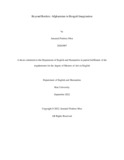| dc.contributor.advisor | Azim, Firdous | |
| dc.contributor.author | Mou, Jannatul Ferdous | |
| dc.date.accessioned | 2023-01-17T09:13:51Z | |
| dc.date.available | 2023-01-17T09:13:51Z | |
| dc.date.copyright | 2022 | |
| dc.date.issued | 2022-09 | |
| dc.identifier.other | ID 20263007 | |
| dc.identifier.uri | http://hdl.handle.net/10361/17743 | |
| dc.description | This thesis report is submitted in partial fulfillment of the requirements for the degree of Masters of Arts in Teaching to Speakers of Other Languages, 2022. | en_US |
| dc.description | Cataloged from PDF version of thesis. | |
| dc.description | Includes bibliographical references (pages 40-43). | |
| dc.description.abstract | Syed Mujtaba Ali and Zia Haider Rahman are two notable authors who wrote on issues that transcend national boundaries and address universal themes of identity, domination, power and acceptability. I will be looking at Syed Mujtaba Ali’s memoir In a Land Far from Home (2015) (translated from the original Bengali Deshe Bideshe (1948)) and Zia Haider Rahman’s novel In the Light of What We Know (2014). This research aims to examine how these two authors (Mujtaba Ali and Zia Haider Rahman) represent Afghanistan by amalgamating fact and fiction altogether. The thesis proposes to trace their feelings of familiarity and unfamiliarity and to look at the construction of the uncanny in a space that is both familiar and unfamiliar. This will be done by looking at some characters from both In a Land Far from Home and In the Light of What We Know to understand how uncanny feelings develop to create distinct images of the self and the other while negotiating identity and culture in a “strangely familiar” (Freud 4) land. Besides, this study also critically evaluates the transition of global power relations to identify new forms of domination over Afghanistan, both the land and the people. To evaluate the characters’ inner conflict, this study will use Freud’s discussion of the uncanny, Homi K. Bhabha’s idea of liminality, and Lacan’s mirror stage. Besides, this thesis will also incorporate Antonio Gramsci’s concept of hegemony, Louis Althusser’s identification of Ideological and Repressive State Apparatuses (“ISA and RSA”), Edward Said’s method of contrapuntal reading and ideas of cultural imperialism, Kwame Nkrumah’s analysis of Neocolonialism, Michel Foucault’s idea of power and dependency theory to trace the new forms of internal and global power operations in Afghanistan. | en_US |
| dc.description.statementofresponsibility | Jannatul Ferdous Mou | |
| dc.format.extent | 43 pages | |
| dc.language.iso | en | en_US |
| dc.publisher | Brac University | en_US |
| dc.rights | Brac University theses are protected by copyright. They may be viewed from this source for any purpose, but reproduction or distribution in any format is prohibited without written permission. | |
| dc.subject | Uncanny | en_US |
| dc.subject | Foreign land | en_US |
| dc.subject | Mirror image | en_US |
| dc.subject | Hegemony | en_US |
| dc.subject | Power | en_US |
| dc.subject | Neocolonialism | en_US |
| dc.subject.lcsh | Colonial influence | |
| dc.title | Beyond borders: Afghanistan in Bengali imagination | en_US |
| dc.type | Thesis | en_US |
| dc.contributor.department | Department of English and Humanities, Brac University | |
| dc.description.degree | M. in English | |

